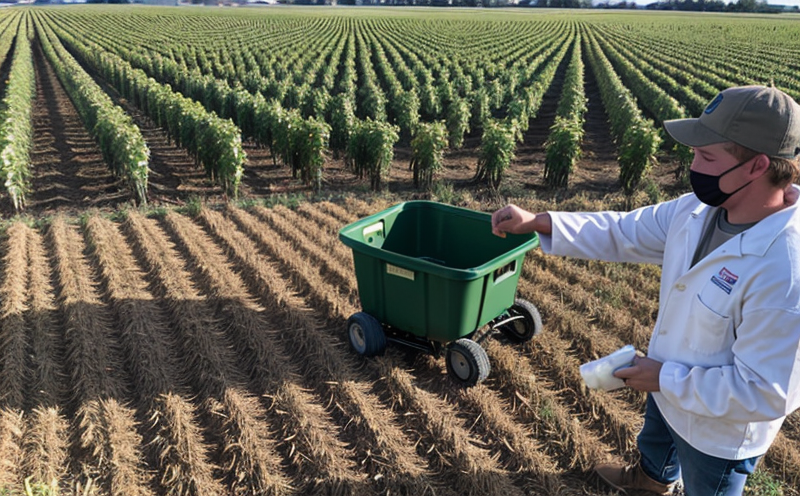Fruit Firmness Testing
Understanding fruit firmness is critical in agriculture and forestry testing. Firmness can be a key factor in determining the quality, shelf life, and overall market value of fruits post-harvest. This service involves a series of tests designed to measure the resistance of fruits to compression or indentation forces, which helps ensure that they meet the required standards for distribution and consumption.
The process starts with selecting representative specimens from various stages of ripeness and maturity. These samples are then prepared by carefully washing them if necessary, removing any blemishes or defects, and ensuring that each fruit is at a consistent temperature to prevent any changes in firmness during testing. The choice of equipment varies based on the type of fruit being tested, but it typically includes penetrometers or compression testers.
During the test, fruits are positioned under controlled conditions where they undergo compression or indentation by a calibrated probe. The force required to penetrate the fruit is recorded and converted into an index of firmness. This data allows for detailed analysis that can identify optimal harvesting times, predict shelf life, and ensure consistent quality across batches.
The results are compared against industry standards such as ISO 14672 or ASTM D883 to ensure accuracy and reliability. These standards provide a framework for consistency in testing methodologies and acceptance criteria, ensuring that the data generated is comparable with other laboratories around the world.
- Proper specimen preparation
- Controlled environmental conditions during testing
The service also includes detailed reporting which outlines the firmness values for each fruit type tested, along with insights into potential quality issues or improvements that can be made to the harvesting and post-harvest handling processes. This information is invaluable for quality managers, compliance officers, R&D engineers, and procurement teams working in agriculture and forestry.
Benefits
Fruit firmness testing offers numerous benefits that can significantly impact the agricultural sector. By ensuring consistent fruit firmness, this service helps maintain product quality throughout the supply chain, reducing waste and enhancing marketability. The data generated from these tests can inform better decision-making regarding harvesting times, storage conditions, and transportation methods.
For quality managers and compliance officers, firmness testing provides a tool to verify that fruits meet specific quality standards set by regulatory bodies or industry associations. This ensures products are safe for consumption and comply with international trade requirements. R&D engineers can use the results of these tests to innovate new techniques in post-harvest handling and storage.
From an economic perspective, accurate firmness testing helps businesses optimize their operations by reducing spoilage rates and increasing profitability. Procurement teams benefit from this service as it allows them to source fruits that meet stringent quality criteria, ensuring they can reliably supply high-quality products to consumers.
Quality and Reliability Assurance
- Calibration: Ensuring all equipment used in testing is regularly calibrated according to ISO standards helps maintain accuracy.
- Data Verification: Multiple tests are conducted on each specimen, and the results are cross-verified before final reports are generated.
The quality of the data produced through this service is crucial for making informed decisions in agriculture and forestry. Regular calibration ensures that all instruments used are operating at peak performance, thereby minimizing errors due to instrument malfunction or drift over time. Data verification involves comparing multiple readings from different tests on the same specimen to ensure consistency.
The use of advanced analytical techniques further enhances the reliability of the results. These methods involve statistical analysis and comparison against historical data sets, which helps in identifying trends and anomalies that might indicate issues with specific batches or varieties of fruits. This comprehensive approach ensures that the firmness testing service is not only precise but also robust enough to withstand scrutiny by regulatory authorities.
International Acceptance and Recognition
- Fruits tested adhere to international standards such as ISO 14672, which are widely recognized across different countries.
- The results from this service can be used in global markets where compliance with international standards is essential for trade.
Testing fruit firmness according to internationally accepted standards like ISO 14672 ensures that the findings are relevant and acceptable on a global scale. This standard provides clear guidelines on how to measure and report fruit firmness, making sure that all laboratories following it produce comparable results.
The acceptance of these test results in international markets is crucial for businesses operating globally or those who export their products internationally. Compliance with such standards not only simplifies the import/export process but also builds trust among customers and partners. This recognition enhances brand reputation and fosters long-term relationships within the industry, particularly beneficial for companies involved in agricultural trade.





